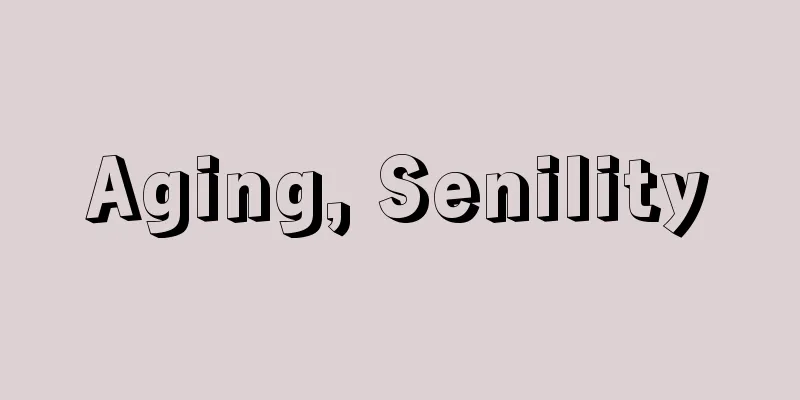Aging, Senility

|
◎ Physiological aging and pathological aging Unless we are killed by an accident or illness at some point in our lives, we go through the following process before dying: birth → development (growth) → maturity → decline (regression). This series of processes is called aging, and although aging itself can also be called senility, the physical and mental changes that occur after maturity are usually referred to as aging (senility, old age). Aging can be divided into physiological aging and pathological aging. Pathological aging refers to the physical and mental changes that occur after maturity, but do not necessarily occur to everyone. Changes in blood vessels, such as arteriosclerosis due to diabetes or high blood pressure, are representative examples. In contrast, physiological aging refers to the changes in the mind and body that occur to everyone sooner or later after reaching adulthood. In addition to the universality of "always occurring," physiological aging has the following characteristics: "its manifestation is genetically determined (endogenous)," "it always progresses and cannot be reversed (progressive)," and "it always brings about disadvantages to the body (harmful)." Representative examples include presbyopia, cataracts, hearing loss, menopause in women, and deformations of bones and joints. Of course, there is a limit to how long we can live. In Japan, the country with the longest life expectancy in the world, there are now more than 10,000 centenarians, but the oldest person ever to live was 120 years old. The exact cause of aging is still unknown. So far, two causal theories have been proposed: the program theory and the error accumulation theory. ●Program theory: The program theory states that the aging schedule (program) and lifespan are built into the sequence of DNA (deoxyribonucleic acid, the polymeric compound that makes up genes), and that aging develops and progresses according to this schedule. Recently, there has been active research into the search for genes that may promote aging, and there have been a series of announcements about the discovery of such genes. There is also a theory that tumor suppressor genes, which work to prevent cancer cells from proliferating, may also play the role of aging genes. ●Error accumulation theory The error accumulation theory states that the accumulation of mistakes (errors) that occur during DNA and cell regeneration leads to aging. Proposed causes of errors include damage to DNA sequences due to radiation, ultraviolet rays, chemicals, etc. (wear and tear hypothesis), cell damage due to active oxygen (free radical hypothesis), impaired cellular function due to abnormal chemical bonds between protein molecules (cross-linking hypothesis), accumulation of abnormal proteins due to errors in sequence transcription during the DNA replication process or when repairing damaged DNA (error-catastrophe hypothesis), and accumulation of waste products such as lipofuscin (a type of mutant enzyme) and amyloid (a type of mutant protein) (waste accumulation hypothesis). ●Which theory is more likely? Based on recent research results, the program theory is said to be the more likely, but some experts believe that without incorporating both theories, it may not be possible to fully explain how aging occurs. Characteristics of physical and mental aging A better lifestyle in retirement Characteristics of physical and mental aging ◎Characteristics of physical aging ●Even if environmental conditions change in a way that can easily cause the overall condition of the body to deteriorate , the inside of our bodies is always maintained in a constant state. This is called homeostasis, and if it is disrupted, not only will it impair your health, but if it worsens, it can be life-threatening. Homeostasis is maintained by the functioning of multiple organs, such as the lungs, liver, and kidneys, and is controlled by the endocrine system (hormones), nervous system (autonomic nervous system), and immune system (defense against infection). This function weakens in the elderly, so homeostasis is easily disrupted and the overall condition of the body is prone to deterioration. ●Elderly people who have multiple illnesses often have multiple illnesses. The older a person is, the more illnesses they have. This makes treatment difficult. For example, in the case of high blood pressure, even if you try to use a thiazide antihypertensive drug, if you also have diabetes, you cannot use it because it will worsen the diabetes. Similarly, even if you try to use a beta-blocker, you cannot use it if you also have bronchial asthma or heart failure, because it will worsen these diseases. Furthermore, even if rehabilitation is attempted for the aftereffects of a stroke, it may not be possible to provide adequate rehabilitation due to the presence of a myocardial infarction. ●Even as we age, there are large individual differences , and some people's organs function the same as in adults, while for others the functions are extremely impaired. For this reason, even if someone has the same disease, the symptoms and severity of the disease can vary greatly from person to person. Elderly people with atypical symptoms often do not show the typical symptoms of a disease, or the symptoms they show are different from those of their younger years. For example, typical symptoms of pneumonia include fever, cough, and phlegm, but elderly people may not show these symptoms and their main symptoms may be loss of appetite or impaired consciousness. In addition, people with myocardial infarction may not complain of chest pain. Elderly people who are prone to dehydration have less water stored in their bodies. Furthermore, because their senses have become dulled, they do not feel thirsty even when their body is low on water, and they do not drink much, which makes them more susceptible to dehydration. When you become dehydrated, the amount of blood circulating decreases. As a result, the amount of blood going to the brain decreases, causing loss of consciousness, and because the amount of blood flowing to the kidneys decreases, waste products such as urea nitrogen and creatinine that should be excreted from the body in urine are not excreted, and their amount in the blood increases. ●Elderly people tend to suffer from many chronic illnesses that are difficult to cure completely. • Older people react differently to medicines Older people react differently to medicines than younger people. For example, because kidney function is impaired, drugs are not excreted in the urine, causing them to accumulate in the body and resulting in unexpected side effects. Therefore, it is best not to use multiple over-the-counter medications frequently and without prior notice. ●Acute illnesses are difficult to cure because the body's ability to maintain homeostasis is weakened. Even illnesses that are simple colds tend to recover slowly and become severe, making it easier to develop complications such as pneumonia. Characteristics of mental aging The ability to recognize, remember, recall, and synthesize things is intellectual function (intellectual ability), which in men is said to peak between the ages of 25 and 35 and then gradually declines. In particular, calculation, memory, spatial cognition, and reasoning are said to gradually decline from middle age onwards. In addition, if your living environment changes due to moving or hospitalization, your intellectual functioning tends to decline. Intellectual decline is also a major symptom of Alzheimer's disease. ● Personality changes Some people's personalities change as they get older. There are three types of personality changes: the expansion type, in which an individual's innate personality becomes more pronounced; the reaction type, in which a person's innate personality changes in the opposite direction (for example, a shy person becomes aggressive or a carefree person becomes short-tempered); and the maturation type, in which a person changes to a more harmonious and well-rounded personality (for example, a difficult person becomes more calm). Some people also become self-centered and conservative in their thoughts and actions, more suspicious, less lively, and more gloomy. A depressive state is when you are seized by a feeling of melancholy , your mood drops, and you are plagued by anxiety, and many elderly people suffer from this emotion. Much of the depression among the elderly is what is known as reactive depression, triggered by worries about health or finances, estrangement from relationships at home or in society, and loss of goals in life. Depression should be relieved if the trigger is removed, but it is often difficult to get out of it. This is related to the fact that elderly people have difficulty changing their mood or switching their feelings. Some elderly people focus all their attention on their own health and physical condition, and become excessively preoccupied with this, when they should be focusing their attention on external things. And often, a large part of our daily lives is focused on our own health and the state of our physical condition. A better lifestyle in retirement ◎Reassess your dietOnce you reach middle age, changes occur in the components of your body (body composition).Even if your weight doesn't change, the percentage of your body weight made up of fat increases, and the percentage of your body weight made up of non-fat tissues (muscle, connective tissue, bones, etc.) (lean body mass) decreases. This is because as we age, our appetite, mastication (the act of chewing food), digestion/absorption, metabolism, and excretion change from when we were younger, resulting in a decrease in muscle mass, a decrease in muscle strength, a decrease in intracellular water content, a decrease in bone mineral content (the amount of calcium, phosphate, etc. that make up bones), and loosening and drying of skin tissue. As elderly people lose their lean body mass, their physical strength gradually declines, and ultimately it can become life-threatening (Column: "Loss of lean body mass and prognosis in the elderly"). Weight gain in the elderly is mostly due to an increase in fat tissue, and rarely an increase in lean body mass. Therefore, it is important not to lose the current lean body mass. ● Diets that do not reduce lean body mass Elderly people tend to have small appetites, but it can be a problem if they are losing weight despite eating normally. It is best to maintain an energy intake of 1600-1800 kcal per day. Instead of sticking to three meals a day, try to eat more frequently and in small portions. You also need to take in protein to prevent the loss of muscle and other body protein. 12-14% of your daily energy intake should come from protein. It is a good idea to focus on processed soy products such as tofu and fish protein. Eating too much lipids and carbohydrates causes fat to accumulate in the body, leading to obesity and making you more susceptible to developing ischemic heart disease, colon cancer, breast cancer, and other cancers. Fat intake should make up 20-25% of your daily energy intake, ideally in a ratio of 2 parts vegetable fat to 1 part animal fat. Ingesting calcium does not increase bone mineral density, but if you do not consume enough, the calcium stored in your bones will be consumed, further worsening the deficiency of bone mineral density, so you should try to consume 600mg per day. You can meet this requirement by drinking 200ml of milk every day. You should also be careful about consuming insufficient amounts of vitamin C, vitamin E, and essential trace elements (iron, zinc, copper, manganese, iodine, cobalt, chromium, selenium, and molybdenum). If you eat a wide variety of foods, you will not be deficient in any of these nutrients. ◎ Simply taking in enough nutrition to sustain your exercise does not necessarily prevent muscle and bone loss. To prevent loss of muscle and bone mass, it is necessary to take in enough nutrition, exercise, move the muscles, and put a certain amount of strain on the bones. If you don't use them, your muscles will weaken and your bone mineral density will decrease. ●Walking exercise is recommended. Strenuous exercise is difficult for the elderly, so the most suitable exercise is walking, which anyone can do. Walking doesn't require any equipment, facilities or a trainer, and it can be done whenever it's convenient for you. Walk at a pace that makes you sweat slightly. Walking aimlessly will not be effective. Continue walking at this pace for about 15 to 20 minutes a day. It is important to keep walking, as taking a break in between will reduce the effect. In addition, to prevent loss of muscle and bone mass, it is necessary to exercise regularly. Ideally, you should exercise every day, or at least five days a week. Exercising only occasionally, when you feel like it, will not stop muscle and bone loss. ◎ Smokers must quit smoking. It has been proven that smoking induces ischemic heart disease (angina pectoris, myocardial infarction) (Column "Coronary Risk Factors"), increases the incidence of lung cancer, and makes one prone to chronic obstructive pulmonary disease (chronic bronchitis, emphysema), bronchial asthma, etc. ("Tobacco and Respiratory Diseases"). It is known that these risks also extend to non-smokers who are in close proximity to smokers and inhale the smoke through passive smoking, a condition known as second-hand smoke. Also, when comparing the 10-year survival rates of smokers and non-smokers, the survival rates of smokers are lower and those of non-smokers are higher, but research has shown that if you quit smoking, your survival rate will be somewhere in between the two. If you quit smoking, your survival rate will be higher than that of smokers. People tend to be tolerant of elderly people smoking, thinking things like, "They've looked forward to it for many years, and they don't have much time left," but it is better for them to quit smoking, both for their own health and the health of those around them. ◎ Drink alcohol in moderation Opinions about the effects of alcohol on health are mixed among experts. Some experts say that "it's better not to drink alcohol because it increases neutral fats," while others say that "it's okay to drink small amounts, as it has effects such as recovering from fatigue, relieving stress, changing your mood, and helping you sleep well." However, even experts who are in favor of alcohol tolerance state that conditions for drinking include following appropriate drinking habits, such as 1) drinking the appropriate amount of sake, about one cup per day, 2) having two "liver-free days" per week, and 3) eating snacks rich in protein. Naturally, if you have liver dysfunction, it is absolutely necessary to abstain from alcohol. ◎Reassess your sleeping habits . Many elderly people doze off during the day because they don't get enough sleep due to problems falling asleep, not getting a deep sleep, waking up in the middle of the night, or waking up too early in the morning. There are also elderly people who go to bed early in the evening, wake up in the middle of the night, and then have trouble falling asleep. Insomnia in the elderly can be caused by mental illness, respiratory illness, ear, nose, and throat illness, as well as sleep apnea syndrome and myoclonus. It can also be caused by mental stress or changes in the environment. Once the cause has been identified, it is important to remove it, such as by treating an illness. On the other hand, insomnia is often caused by poor sleeping habits among the elderly. In this case, it is important to reconsider your sleep habits and adopt an appropriate style. If left untreated, your anxiety about sleep will increase and become chronic, making it difficult to correct. Develop good sleep habits: First, try to go to bed and wake up at the same time each day to keep your sleep-wake cycle and amount of sleep consistent. Try to relax before bed, such as by listening to your favorite music, and sleep in a quiet room with no light. Moving your body every day, such as walking, can help you fall asleep. However, exercising at night can have the opposite effect. Try to do it during the day. Stop drinking alcohol 3 hours before going to bed and avoid drinking after that. Avoid caffeinated drinks as they keep you awake and keep you from falling asleep. Retired people and those who have finished raising their children and who have participated in social activities often lose their goals for the future, lose motivation in life, feel helpless, and suffer from physical and mental problems. To prevent this from happening, it is important to create opportunities for people to participate in social activities even before they retire. Participate in community activities as much as possible, such as those of your local neighborhood association. It is also worthwhile to join a senior citizens' club. Even after retirement, you can set goals in life and look forward to a fulfilling life. Source: Shogakukan Home Medical Library Information |
|
◎生理的老化と病的老化 私たちは、人生の途中で事故や病気で命を奪われないかぎり、誕生→発育(成長)→成熟→衰退(退行)という経過をたどって死に至ります。 この一連の過程を加齢(かれい)といい、加齢そのものを老化ということもありますが、ふつうは、成熟期以降におこる心身の変化を老化(ろうか)(老衰(ろうすい)、老年(ろうねん))と呼んでいます。 老化は、生理的老化と病的老化とに分けられます。 病的老化とは、成熟期以降におこる心身の変化のうち、だれにでも必ずおこるとはかぎらないものをいいます。血管の変化、つまり糖尿病や高血圧による動脈硬化(どうみゃくこうか)などがその代表です。 これに対し、成熟期以降になると、遅かれ早かれ、だれにでも必ずおこってくる心身の変化を生理的老化といい、「必ずおこる」という普遍性(ふへんせい)のほかに、「発現が、遺伝的に決定されている(内在性)」「必ず進行し、後もどりはしない(進行性)」「必ずからだに不利をもたらす(有害性)」という特徴をもっています。老眼(ろうがん)、白内障(はくないしょう)、難聴(なんちょう)、女性の閉経(へいけい)、骨・関節の変形などがその代表です。 もちろん、寿命には限界があります。世界一の長寿国、日本では100歳老人が1万人を超えるようになりましたが、過去の最高齢者は120歳です。 ◎老化の原因 老化の確かな原因は、まだわかっていません。 これまでのところ、プログラム説とエラー蓄積説という2つの原因説が提唱されています。 ●プログラム説 老化のスケジュール(プログラム)や寿命が、あらかじめDNA(デオキシリボ核酸=遺伝子を構成している高分子化合物)の配列の中に組み込まれていて、このスケジュールに沿って老化は発症、進行するというのがプログラム説です。 最近は、老化を推進させる老化遺伝子(ろうかいでんし)ともいうべき遺伝子を探す研究が盛んで、それらしい遺伝子が見つかったという発表が相次いでいます。 がん細胞が増殖しないようにはたらいているがん抑制遺伝子が、老化遺伝子の役割をはたしているのではないかとする説もあります。 ●エラー蓄積説 DNAと細胞再生の過程でおこる失策(エラー)の積み重ねが老化を招くというのがエラー蓄積説です。 エラーがおこる原因には、放射線・紫外線・化学物質などによるDNA配列の損傷(摩耗説(まもうせつ)(磨耗説)、すり切れ説)、活性酸素による細胞の損傷(遊離基説(ゆうりきせつ))、たんぱくの分子間の異常な化学的な結合による細胞機能の障害(架橋結合説(かきょうけつごうせつ))、DNAの複製過程やDNAの損傷の修復時の配列転写の誤りによる異常たんぱくの蓄積(エラー破滅説、エラー・カタストロフ説)、リポフスチン(変異酵素(へんいこうそ)の一種)、アミロイド(変異たんぱくの一種)などの老廃物の蓄積(老廃物蓄積説)などが提唱されています。 ●どちらの説が有力か 最近の研究結果からみると、プログラム説が有力といわれていますが、両方の説を取り入れないと、老化がおこるしくみを説明しきれないのではないかという専門家もいます。 からだと心の老化の特徴 老後のよりよいライフスタイル からだと心の老化の特徴 ◎からだの老化の特徴 ●全身状態が悪くなりやすい 環境の状況が変化しても、私たちのからだの中は、いつも一定の状態に保たれています。 これをホメオスターシス(恒常性維持(こうじょうせいいじ))といい、これが崩れると、健康が損なわれるばかりではなく、悪くすると生命にかかわります。 ホメオスターシスは、肺、肝臓、腎臓(じんぞう)などの複数の臓器のはたらきによって維持され、内分泌系(ないぶんぴつけい)(ホルモン)、神経系(自律神経(じりつしんけい))、免疫系(めんえきけい)(感染防御)によってコントロールされています。 お年寄りは、このはたらきが衰えていて、簡単にホメオスターシスが崩れ、全身状態が悪くなりやすいものです。 ●1人で複数の病気をもっている お年寄りは、1人で複数の病気をもっていることが少なくありません。高齢者ほど、もっている病気の数が多くなります。 そのために、治療がむずかしくなります。 たとえば、高血圧の場合、サイアザイド(チアジド)系降圧薬を使用しようとしても、糖尿病を合併していると、糖尿病を悪化させてしまうので使えませんし、β遮断薬(ベータしゃだんやく)を使用しようとしても、気管支ぜんそくや心不全(しんふぜん)を合併していると、これらの病気を悪化させてしまうので使用できません。 また、脳卒中(のうそっちゅう)の後遺症に対してリハビリテーションを行なおうとしても、心筋梗塞(しんきんこうそく)を合併しているために十分にできないということもあります。 ●個人差が大きい 年をとっても、いろいろな臓器のはたらきが成人と変わらない人もいますし、極端に低下している人もいます。 このため、同じ病気であっても、病気の現われ方や重症度が人によってひどくちがってきます。 ●症状が、典型的ではない お年寄りは、その病気に典型的な症状が現われなかったり、若いころとは異なった症状が現われることが少なくありません。 たとえば、肺炎は、発熱、せき、たんなどが典型的な症状ですが、お年寄りは、これらの症状が現われず、食欲不振や意識障害が主症状のことがあります。 また、心筋梗塞なのに胸痛(きょうつう)を訴えないこともあります。 ●脱水(だっすい)がおこりやすい お年寄りは、体内に備蓄されている水分が少なくなっています。しかも、感覚が鈍くなっているために、体内の水分が少なくなっても、のどの渇きを感じず、飲料をあまり飲まないので脱水状態になりやすいものです。 脱水状態になると、循環する血液量が減ります。 その結果、脳へ行く血液量が減り、意識障害をおこしたり、腎臓(じんぞう)へ流れる血液量が減るために、尿に含められて体外に捨てられるはずの尿素窒素(にょうそちっそ)やクレアチニンなどの老廃物が捨てられず、血液中の量が増えてしまいます。 ●慢性の病気が多い お年寄りには、完全に治すことがむずかしい慢性の病気が多くなります。 ●薬に対する反応が異なる お年寄りは、薬に対する反応が若い人とは異なります。 たとえば、腎臓機能が衰えているため、尿中に排泄(はいせつ)されず、体内に薬が蓄積して、おもわぬ副作用がおこったりします。 ですから、かってに市販の薬をいくつも、たびたび使用したりしないほうがいいのです。 ●急性の病気が治りにくい ホメオスターシスの維持機能が衰えているため、たとえ、かぜ程度でも回復が遅く、重症になり、肺炎などの合併症がおこりやすくなります。 ◎心の老化の特徴 ●知的機能が低下する 物事を認識し、記憶し、再生し、総合する能力が知的機能(知的能力)で、男性の場合、25~35歳でピークを迎え、以後、しだいに低下するといわれます。とくに、計算・記憶・空間認知・推理などが、中年以降、徐々に低下するといわれています。 また、転居、入院などで生活環境が変わると、知的機能が低下しがちです。 知的機能の低下は、アルツハイマー病のおもな症状でもあります。 ●性格が変化する 年をとるにつれて性格が変化する人もいます。 この性格の変化には、生来の性格がより増強されてくる拡大型(かくだいがた)、生来の性格から反対のほうに変化する反動型(はんどうがた)(内気な人が攻撃的になる、呑気(のんき)な人が短気になるなど)、全体に調和のとれた円満な性格に変化する円熟型(えんじゅくがた)(気むずかしかった人が、穏やかになるなど)の3つのタイプがあります。 また、考えや言動が自己中心的で保守的になる、猜疑心(さいぎしん)が強くなる、活発さが消え、辛気(しんき)くさくなるといった性格になる人もいます。 ●感情が変化する 「憂うつ感」にとらわれ、気分が沈み、不安感にさいなまれるのが、うつ状態(抑うつ状態)で、この感情に悩まされるお年寄りが少なくありません。 お年寄りのうつ状態の多くは、健康や経済面への不安、家庭内や社会での人間関係の疎遠(そえん)、生活目標の喪失などによって誘発される反応性(はんのうせい)うつといわれるものです。 誘因を取り除けば、うつ状態も解消するはずですが、なかなか抜け出せないこともしばしばです。これは、お年寄りは、気分転換や気持ちの切り替えができにくいことも関係しています。 外部に向けるべき関心が、すべて自分の健康状態や体調に向けられ、これに過度にこだわるお年寄りもいます。 そして、日常生活の大部分が自分の健康状態や体調の善(よ)し悪(あ)しに向けられてしまっていることもしばしばです。 老後のよりよいライフスタイル ◎食生活を見直す 中年期をすぎると、からだの構成成分(体組成(たいそせい))に変化がおこってきます。たとえ体重に変化がなくても、体重に占める脂肪の割合が増え、脂肪以外の組織(筋肉、結合組織、骨など)の占める割合(除脂肪体重(じょしぼうたいじゅう))が減ってくるのです。 これは、年をとるにつれて、食欲、そしゃく(食物をかむ動作)、消化・吸収、代謝(たいしゃ)、排泄(はいせつ)の状態が若いころとは変わり、その結果、筋肉の細り、筋力の低下、細胞内の水分の減少、骨塩量(こつえんりょう)(骨を構成しているカルシウム、リン酸などの量)の減少、皮膚組織のゆるみと乾燥などがおこるためです。 お年寄りの除脂肪体重が減ってくると、しだいに体力が衰え、最後には、生命にかかわるようになります(コラム「除脂肪体重減少とお年寄りの予後」)。 お年寄りの体重の増加は、たいていは脂肪組織の増加で、除脂肪体重が増えることはまれです。したがって、現在の除脂肪体重を減らさないことがたいせつになってきます。 ●除脂肪体重を減らさない食事 お年寄りは、「食が細い」のですが、ふつうに食べているのに体重が落ちてくるようでは、困ります。 1日に1600~1800kcalのエネルギー摂取は維持したいものです。1日3食にこだわらず、回数を増やして少しずつ食べるなど、工夫をします。 筋肉などの体たんぱくの量が減らないようにたんぱく質も摂取します。1日の摂取エネルギーの12~14%は、たんぱく質で摂取することが必要です。 豆腐などの大豆(だいず)の加工品や魚のたんぱく質を中心にするといいでしょう。 脂質や糖質のとりすぎは、体内に脂肪を蓄え、肥満を招き、虚血性心疾患(きょけつせいしんしっかん)、大腸(だいちょう)がん、乳がんなどを発症させやすくします。 脂質の摂取は、1日の摂取エネルギーの20~25%にします。しかも、植物性脂肪2に対して動物性脂肪1の割合で摂取するのが理想です。 カルシウムを摂取しても、骨塩量が増えるわけではないのですが、摂取が不足すると、骨に蓄えられているカルシウムの消費量が増え、さらに骨塩量の不足が進行するので、1日600mgは摂取するようにします。毎日の牛乳200mℓの摂取でこの量を満たすことができます。 ビタミンC、ビタミンE、必須微量元素(ひっすびりょうげんそ)(鉄、亜鉛(あえん)、銅、マンガン、ヨウ素、コバルト、クロム、セレン、モリブデン)の摂取不足にも注意が必要です。これらは、いろいろな食品をまんべんなく食べていれば、不足することはありません。 ◎運動を持続させる 十分に栄養を摂取さえしていれば、筋肉や骨の減量を防げるというものではありません。 筋肉、骨の減量を防ぐには、栄養を十分に摂取するとともに、運動をして、筋肉を動かし、骨にある程度の負担をかけることが必要です。 使わずにいると、筋肉は細り、骨塩量は減ってくるのです。 ●お勧めは、歩行運動 お年寄りに激しい運動はむりで、もっとも適しているのは、だれにでもできる歩行運動です。 歩くのであれば、用具も設備も指導者もいりませんし、都合のいいときにいつでも行なえます。 歩く速さは、うっすらと汗ばむくらいの速さです。ブラブラ歩きでは効果がありません。 この速さで1日に15~20分くらい歩き続けます。歩き続けることがたいせつで、途中で休憩をとると効果が減少します。 また、筋肉、骨の減量を防ぐためには、運動は持続して行なうことが必要です。 できれば毎日、少なくても週5日は行なうべきです。気が向いたときにだけ、ときどき行なうというのでは、筋肉、骨の減量を食い止めることはできないのです。 ◎喫煙者は、必ず禁煙を 喫煙は、虚血性心疾患(狭心症(きょうしんしょう)、心筋梗塞(しんきんこうそく))を誘発する(コラム「冠危険因子」)、肺がんの発生率を高める、慢性閉塞性肺疾患(まんせいへいそくせいはいしっかん)(慢性気管支炎(まんせいきかんしえん)、肺気腫(はいきしゅ))、気管支ぜんそくなどを招きやすい(「たばこと呼吸器の病気」)ことが証明されています。 これらの危険性は、受動喫煙(じゅどうきつえん)といって、喫煙者のそばにいて、煙を吸い込んでしまうたばこを吸わない人にもおよぶことがわかっています。 また、喫煙者と非喫煙者との10年後の生存率を比べると、喫煙者は低く、非喫煙者は高いのですが、たばこをやめると、両者の中間くらいの生存率になるという調査結果もあります。たばこをやめると、喫煙者よりも、生存率が高くなるのです。 「長年、楽しみにしてきたのだし、老い先短いのだから」などと、お年寄りの喫煙に対しては、とかく寛容になりがちですが、本人の健康のためにも、周囲にいる人の健康のためにも、たばこは、やめさせたほうがいいのです。 ◎飲酒は、ほどほどに 飲酒が健康に与える影響については、専門家の間でも、意見が功罪相半ばしています。 「中性脂肪を増やすので、お酒を飲まないほうがいい」という専門家もいれば、「疲労回復、ストレス解消、気分転換、快眠への誘導といった効果があるので、少量なら飲んでも構わない」という専門家もいます。 ただ、飲酒許容派の専門家にしても、①日本酒にして、1日1合程度という適量を守る、②週2日の「休肝日(きゅうかんび)」を設ける、③たんぱく質の豊富なつまみをとる、などの適切な飲み方を守るのを飲酒の条件としています。 当然のことながら、肝機能に異常があれば、禁酒が絶対に必要です。 ◎睡眠の状態を見直す 寝つきが悪い、眠りが浅い、夜中に目が覚める、朝早く目が覚めるなどのために寝足りず、昼間、居眠りするお年寄りが少なくありません。 また、夕方、早々と床に入り、深夜に目覚めてその後、眠れないというお年寄りもいます。 お年寄りの不眠は、心の病気、呼吸器の病気、耳・鼻・のどの病気のほか、睡眠時無呼吸症候群(すいみんじむこきゅうしょうこうぐん)(「睡眠時無呼吸症候群」)やミオクロヌス(「ミオクローヌス」)のこともあります。また、精神的なストレスや環境の変化などが原因のこともあります。 原因がはっきりしたら、病気であれば治療するなど、原因を取り除くことがたいせつです。 一方、お年寄りには、睡眠の習慣が適切でないためにおこる不眠も少なくありません。 この場合は、睡眠を見直し、適切なスタイルを身につけることがたいせつです。放置すると、睡眠に対する不安が高じ、慢性化して、是正がむずかしくなります。 ●適切な睡眠習慣を身につける まず、同じ時刻に床に入り、同じ時刻に起床するようにし、毎日の睡眠・覚醒(かくせい)の周期や睡眠量を一定に保つようにします。 好きな音楽を聞くなど、寝る前のリラックスを心がけ、光の入らない、静かな部屋で寝るようにします。 歩行運動などで毎日、からだを動かすと、眠りやすくなります。ただし、夜の運動は逆効果です。昼間、行なうようにします。 飲酒は、寝る3時間前で打ち切り、それ以降は飲まないようにします。目がさえて眠れなくなるので、カフェイン入りの飲料を飲むのも控えます。 ◎社会活動に参加する 定年退職した人や子育てを終えた人は、将来の目標がなくなり、生活の張りを失って、無力感にとらわれ、心身に不調が生じることが多いものです。 このようなことのないように、引退する以前から参加できる社会活動の場をつくっておくことがたいせつです。 町内会の活動など、できるだけ社会活動に参加しましょう。老人クラブへの入会も有意義なことです。 引退後も人生の目標ができ、充実した生活が期待できます。 出典 小学館家庭医学館について 情報 |
Recommend
Chimney - Ento
1 chimney. "Clouds are moving quickly above t...
Gundolf - Gundolf (English spelling) Friedrich Gundolf
German (Jewish) literary historian and poet. His ...
Aphelandra Camissoniana - Aphelandra Camissoniana
...It has few leaves and is somewhat difficult to...
Ishiwari - Ishiwari
→ Stone shellfish Source : Heibonsha Encyclopedia ...
Dendrocopos leucotos (English spelling)
…Woodpecker [Takashi Saito]. . . *Some of the ter...
Sodium hydroxide - Sodium hydroxide
A hydroxide of sodium. It is also known as causti...
Floating Woman - Ukareme
A woman who entertains people by singing and danci...
Cinchona succirubra (English spelling) Cinchona succirubra
…[Mr. Makoto Fukuoka] [Mr. Aya Nitta]. … *Some of...
Goshogake [Hot spring] - Goshogake
This hot spring is located in Hachimantai, Kazuno ...
Turlupin
...The latter produced Pierre de Larivey's (c...
Primary education
Along with secondary education and higher educati...
Sedulius Scotus
…The Alcuinian tradition produced many excellent ...
Red crab - Red crab
This crab belongs to the order Decapoda, class Cr...
Mariko Okada - Mariko Okada
1933- An actress from the late Showa to Heisei er...
Miyakojima
It is the main island of the Miyako Islands in th...









